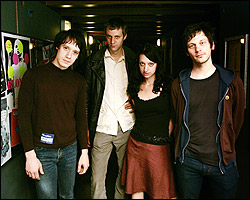SALVADORIAN BAKERY 1719 S.W. Roxbury St., WHITE CENTER 206-762-4064; 8 a.m.-9 p.m. daily
EL TRAPICHE PUPUSEŔ AND RESTAURANT 127 S.W. 153rd St., BURIEN 206-244-5564; 10 a.m.-9 p.m. daily
Several weeks ago, on the Sunday after Thanksgiving—a day usually reserved for scraping the bottom of the mashed potato leftovers and mapping out a game plan for getting back into my slimmest jeans—I found my one true love: the pupusa. On that fateful day, my friend Josh showed up with a take-out box full of what looked like stuffed pancakes, a mutant strain of coleslaw, and a dish of thin, light red sauce. The smell emanating from the Styrofoam container drew everyone in the house into the kitchen. Unsuccessfully, I tried to fend them off with my plastic fork, these hungry people who just seconds before I would have called friends—sharing was no longer a word I was comfortable with. Five minutes later, I was all but begging Josh to refire his motorcycle and take me to Burien. I was in love, and I needed more.
THINK OF THE PUPUSA as El Salvador’s fork-and-knife answer to Mexico’s taco—or perhaps its sassy, spicy reply to France’s cr갥. Essentially a cornmeal cake stuffed with cheese, loroco (a Salvadorian flower petal that is treated like a vegetable), chicharron (a crispy, baconlike meat), refried beans, pork, and chicken (or a combination thereof) and then fried to gooey, oozing perfection, the pupusas are served with cortida, a spicy—emphasis on spicy—slaw, and a dollop of unspicy tomato sauce. The cakey cornmeal casing serves as a buffer to the rich, decadent filling, and the crunchy, red-pepper-flaked slaw gives the whole thing a kick. (I can’t say exactly what purpose the tomato sauce serves, but it sure tastes good.)
At about a dollar and a half to two bucks each, pupusas are the ultimate stackable food: one for a snack, two for lunch, three for dinner. Salvadorians use a delicious, salty, fetalike cheese called cotija or anejo that basically kicks the ass of any ingredient it’s paired with, and loroco, although a decidedly more subtle filling, gives the pupusa a sweet, almost spinachlike flavor, though its white, creamy texture gives no hint of it. The pork and chicken are cooked slowly to render them tender and juicy, then shredded. The refried beans have a soupier quality than the Mexican restaurant side-dish variety.
But where to procure these delicious little things? Just as Mexicans have taquer�, Salvadorians have pupuser�. There just aren’t many of them in this town—two, to be exact.
El Trapiche Pupuser�and Restaurant is situated in a Burien strip mall between a Pakistani superstore and an empty lot, but do not let the humble surroundings fool you. El Trapiche is, at any given hour, bustling with Spanish-speaking clients and schooled gringos who know the fixin’s here are the real deal. Back behind the counter, you’ll see several women working hard above the hot grill, and the menu relays that their pupusas—the house specialty, naturally—are all prepared fresh as ordered.
You may even find yourself whiling away an entire afternoon or evening in the oddly spacious, purple-painted dining room. El Trapiche offers a full menu of Salvadorian specialties along with those perfect little pupusas. On a recent trip, my friends (forgiven for eating “my” pupusas as they forgave me for the plastic fork attack) and I enjoyed the fried plantains ($4.75; just try not to think about how closely the fried plantain looks like a sunburned banana slug), the fried yucca ($4.75; about eight times sweeter, thicker, and tastier than a gas station jo-jo), and another fried corn item, the name and price of which I forgot to write down, rhapsodic as I was in my passionate eating frenzy.
Though they’re closer to the city limits than their Burien competition, the folks at Salvadorian Bakery speak English with a heavier accent and supply their customers with a Spanish-only white board in lieu of a menu. Just smile and ask for help, though—they seem used to it. Here you must order at the counter, and then the kind staff will give you a number and bring you your food at the cafeterialike table of your choice.
While it would appear that Salvadorian Bakery does the bulk of its business in fancy wedding cakes and pastries (and prepaid long-distance phone cards, Latin music CDs, and pi�s), they’re equally adept at filling and frying a pupusa. Those same friends and I found no discernable difference between Trapiche’s pupusas and the bakery’s—both were absolutely delicious.
Factors favoring the Bakery over Burien are its slightly closer-in location and the amazingly wonderful cr譥-filled raviolilike shortbread cookies (50 cents), which make a great post-pupusa treat. Throw in real sugar-sweetened Coca-Cola imported from Mexico in glass bottles (none of your wimpy canned gringo corn-syrup Coke here), and it’s the Bakery by a nose.









